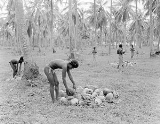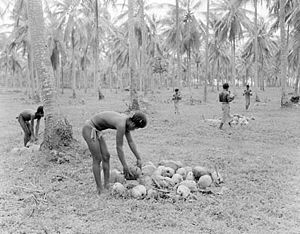
Copra plantations in New Guinea
Encyclopedia

Germany
Germany , officially the Federal Republic of Germany , is a federal parliamentary republic in Europe. The country consists of 16 states while the capital and largest city is Berlin. Germany covers an area of 357,021 km2 and has a largely temperate seasonal climate...
colonialists, they were superseded by Australia
Australia
Australia , officially the Commonwealth of Australia, is a country in the Southern Hemisphere comprising the mainland of the Australian continent, the island of Tasmania, and numerous smaller islands in the Indian and Pacific Oceans. It is the world's sixth-largest country by total area...
n interests following World War II
World War II
World War II, or the Second World War , was a global conflict lasting from 1939 to 1945, involving most of the world's nations—including all of the great powers—eventually forming two opposing military alliances: the Allies and the Axis...
.
Early colonialists
In 1884, GermanGermany
Germany , officially the Federal Republic of Germany , is a federal parliamentary republic in Europe. The country consists of 16 states while the capital and largest city is Berlin. Germany covers an area of 357,021 km2 and has a largely temperate seasonal climate...
settlers arrived in eastern New Guinea
New Guinea
New Guinea is the world's second largest island, after Greenland, covering a land area of 786,000 km2. Located in the southwest Pacific Ocean, it lies geographically to the east of the Malay Archipelago, with which it is sometimes included as part of a greater Indo-Australian Archipelago...
(now Papua New Guinea
Papua New Guinea
Papua New Guinea , officially the Independent State of Papua New Guinea, is a country in Oceania, occupying the eastern half of the island of New Guinea and numerous offshore islands...
), and planted Coconut palms
Coconut
The coconut palm, Cocos nucifera, is a member of the family Arecaceae . It is the only accepted species in the genus Cocos. The term coconut can refer to the entire coconut palm, the seed, or the fruit, which is not a botanical nut. The spelling cocoanut is an old-fashioned form of the word...
(Cocos nucifera) for the production of copra
Copra
Copra is the dried meat, or kernel, of the coconut. Coconut oil extracted from it has made copra an important agricultural commodity for many coconut-producing countries. It also yields coconut cake which is mainly used as feed for livestock.-Production:...
, the dried flesh of the coconut. They established the colony
Colony
In politics and history, a colony is a territory under the immediate political control of a state. For colonies in antiquity, city-states would often found their own colonies. Some colonies were historically countries, while others were territories without definite statehood from their inception....
of German New Guinea
German New Guinea
German New Guinea was the first part of the German colonial empire. It was a protectorate from 1884 until 1914 when it fell to Australia following the outbreak of the First World War. It consisted of the northeastern part of New Guinea and several nearby island groups...
in the north eastern quarter of the island and numerous coconut plantations around coastal areas. They were afraid of venturing too far inland. To counter the growing German presence in the region, the Australia
Australia
Australia , officially the Commonwealth of Australia, is a country in the Southern Hemisphere comprising the mainland of the Australian continent, the island of Tasmania, and numerous smaller islands in the Indian and Pacific Oceans. It is the world's sixth-largest country by total area...
n state of Queensland
Queensland
Queensland is a state of Australia, occupying the north-eastern section of the mainland continent. It is bordered by the Northern Territory, South Australia and New South Wales to the west, south-west and south respectively. To the east, Queensland is bordered by the Coral Sea and Pacific Ocean...
established the Territory of Papua as a de facto
De facto
De facto is a Latin expression that means "concerning fact." In law, it often means "in practice but not necessarily ordained by law" or "in practice or actuality, but not officially established." It is commonly used in contrast to de jure when referring to matters of law, governance, or...
possession covering approximately the south east third of the island. Both the Queensland and German plantations thrived, providing opulent living conditions for the expatriates. Grand mansions were built on the plantations, complete with luxury furnishings. Much of the labour was performed by New Guinea natives. The towns of Port Moresby
Port Moresby
Port Moresby , or Pot Mosbi in Tok Pisin, is the capital and largest city of Papua New Guinea . It is located on the shores of the Gulf of Papua, on the southeastern coast of the island of New Guinea, which made it a prime objective for conquest by the Imperial Japanese forces during 1942–43...
and Rabaul
Rabaul
Rabaul is a township in East New Britain province, Papua New Guinea. The town was the provincial capital and most important settlement in the province until it was destroyed in 1994 by falling ash of a volcanic eruption. During the eruption, ash was sent thousands of metres into the air and the...
were founded as a result of the economic activity surrounding the plantations.
In 1914, Australia
Australia
Australia , officially the Commonwealth of Australia, is a country in the Southern Hemisphere comprising the mainland of the Australian continent, the island of Tasmania, and numerous smaller islands in the Indian and Pacific Oceans. It is the world's sixth-largest country by total area...
sent a small military force to capture the towns of Kokopo
Kokopo
Kokopo is the capital of East New Britain in Papua New Guinea. The capital was moved from Rabaul in 1994 when the volcanoes Tavurvur and Vulcan erupted. As a result, the population of the town increased more than sixfold from 3,150 in 1990 to 20,262 in 2000....
and Rabaul
Rabaul
Rabaul is a township in East New Britain province, Papua New Guinea. The town was the provincial capital and most important settlement in the province until it was destroyed in 1994 by falling ash of a volcanic eruption. During the eruption, ash was sent thousands of metres into the air and the...
. Two Germans were killed in the process, while the remaining German plantation owners were initially sent back to work on their plantations. The 1919 Treaty of Versailles
Treaty of Versailles
The Treaty of Versailles was one of the peace treaties at the end of World War I. It ended the state of war between Germany and the Allied Powers. It was signed on 28 June 1919, exactly five years after the assassination of Archduke Franz Ferdinand. The other Central Powers on the German side of...
saw Germany lose all its overseas colonies, including German New Guinea
German New Guinea
German New Guinea was the first part of the German colonial empire. It was a protectorate from 1884 until 1914 when it fell to Australia following the outbreak of the First World War. It consisted of the northeastern part of New Guinea and several nearby island groups...
. It became the Territory of New Guinea
Territory of New Guinea
The Territory of New Guinea was the Australia-controlled, League of Nations-mandated territory in the north eastern part of the island of New Guinea, and surrounding islands, between 1920 and 1949...
, a League of Nations
League of Nations
The League of Nations was an intergovernmental organization founded as a result of the Paris Peace Conference that ended the First World War. It was the first permanent international organization whose principal mission was to maintain world peace...
Mandate Territory under Australian administration.
Recent history
In 1985 the Copra Marketing Board, an initiative by the PNG government took over copra production.In 1993 Kokonas Industri Koporasen (KIK) built a copra mill in Manang and effectively gained monopoly control over the marketing.
The ill-fated operations of the Copra Marketing Board virtually decimated copra production with copra exports from PNG falling to negligible levels up until 2004.
In 2003 the government ended KIK’s monopoly powers over marketing, and a year later KIK suffered losses that forced the group to call in a liquidator.
In a joint announcement in April 2004 the liquidator of PNG Coconut Commodities, Rex Paki, Coconut Oil Production Madang Ltd (COPM, owned by Donald Brownlie Fleming) and the original mill owners, KIK, announced that COPM had taken possession of the mill.
The copra mill in Madang changed hands in a K7.8 million (US$2.4 million) deal
by the Australian-owned Coconut Oil Production Madang Ltd (COPM). This gave long-suffering copra growers their best news in many years.
COPM immediately raised the price of first grade copra by K100 to K725 (US$223) a ton.
The country’s only other coconut mill being owned by the Carpenter Group located in Rabaul.
This was an excellent outcome for everybody involved in the copra industry in PNG, in particular for the local growers and local people who relied upon income from copra.
According to the Central Bank the PNG’s copra exports in 2003 had plunged to 3,600 tons in that year, levels at which copra exports could be said to be close to extinction, in contrast to exports of more than 9,100 tons by the end of 2004.

